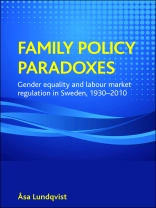Family policy paradoxes examines the political regulation of the family in Sweden between 1930 and today. It draws attention to the political attempts to create a ‘modern family’ and the aspiration to regulate the family and establish gender equality, thereby shedding light on ongoing policy processes within Europe and how these can be understood in the light of a particular political experience.
The book is valuable for researchers, lecturers, undergraduate and graduate students who study gender, gender equality and welfare state development in gender studies, sociology, social and public policy, social work, politics and social/contemporary history
Tabla de materias
Introduction: understanding the political regulation of the family; Mapping, evaluating and formulating modern family life; The family in the Swedish model; Towards gender-neutral ideals and gender equality politics; Family policy in the age of neoliberalism; Family policy and gender equality in the new millennium; Conclusion: family policy paradoxes.
Sobre el autor
Åsa Lundqvist is Associate Professor and Senior Lecturer in the Department of Sociology at Lund University, Sweden. Her research interests include feminist analysis of the history of the welfare state and welfare policies, especially the intersectional relation between labour market regulation and social and family policies.












